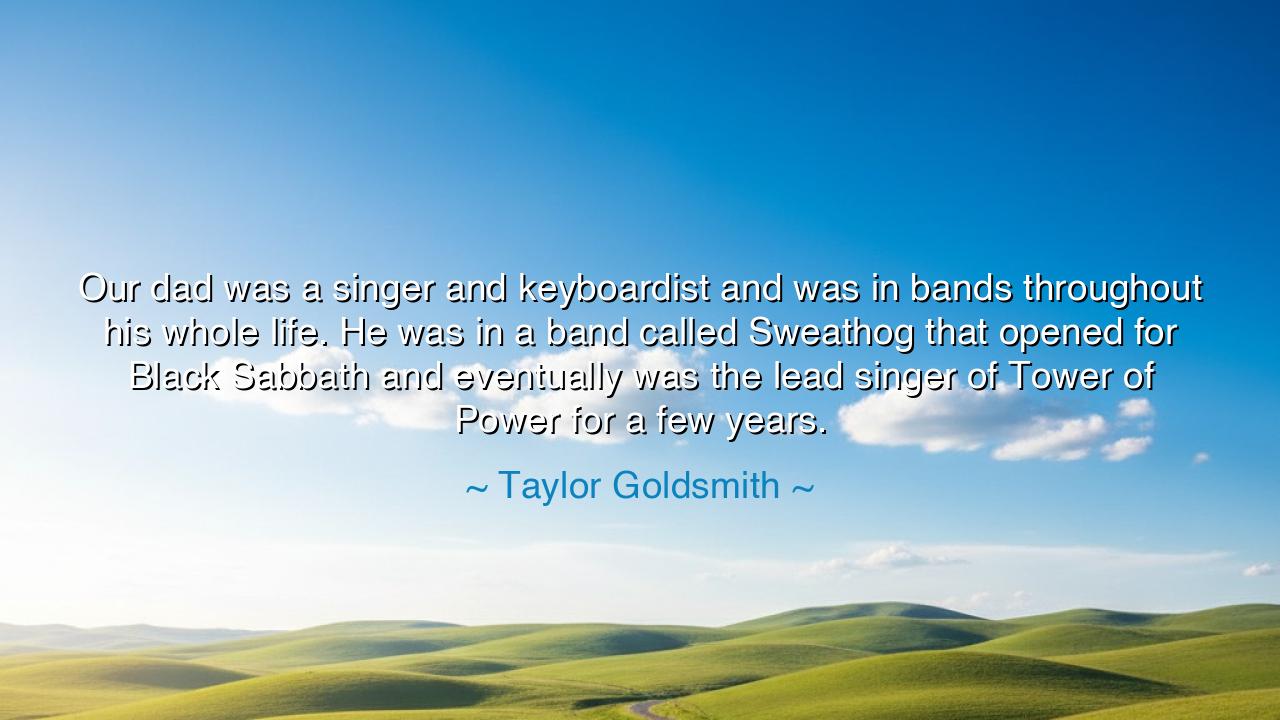
Our dad was a singer and keyboardist and was in bands throughout
Our dad was a singer and keyboardist and was in bands throughout his whole life. He was in a band called Sweathog that opened for Black Sabbath and eventually was the lead singer of Tower of Power for a few years.






"Our dad was a singer and keyboardist and was in bands throughout his whole life. He was in a band called Sweathog that opened for Black Sabbath and eventually was the lead singer of Tower of Power for a few years." — Taylor Goldsmith
In these affectionate and reverent words, Taylor Goldsmith, the musician and frontman of the band Dawes, pays tribute to his father—a man who lived and breathed the eternal rhythm of music. His statement, though simple in form, resonates with a depth that speaks of heritage, artistry, and the sacred inheritance of passion passed from one generation to the next. To say “Our dad was a singer and keyboardist” is not merely to describe a man’s profession; it is to describe a life lived in harmony with purpose. His father’s story is not just about fame or performance, but about the enduring flame of devotion to craft—the kind of fire that, once lit, continues to burn through bloodlines, inspiring those who follow.
The origin of this quote lies in Goldsmith’s reflections on his family’s musical roots. His father, Lenny Goldsmith, was a talented musician whose career carried him through the vibrant decades of rock and soul, from the 1970s onward. He played in Sweathog, a band that shared stages with legendary names like Black Sabbath, and later lent his voice to the iconic soul band Tower of Power, known for its electrifying energy and rhythm. These are not merely biographical details—they are the notes of a symphony that shaped his son’s life. Through his father’s music, Taylor inherited not just melody, but a way of being—a life of artistry, dedication, and unyielding love for creation.
This quote captures a truth that has echoed since ancient times: that artistic legacy is not taught, but absorbed. In every culture, the elders pass down their gifts not through instruction alone, but through presence—through example. Just as a blacksmith’s child learns the rhythm of the hammer, or a poet’s child grows up amidst the music of language, so too did Taylor Goldsmith grow up surrounded by the song of his father’s soul. The stage became a sacred inheritance, and music, the family’s shared language. The story of Lenny Goldsmith is therefore not just one man’s tale—it is the story of how passion, when lived sincerely, plants seeds that bear fruit long after the music fades.
In this, we find a reflection of a universal principle: the power of devotion to inspire across generations. The ancient Greeks believed that every art was watched over by a Muse, but the Muse does not bestow her gifts upon those who seek comfort. She chooses the dedicated, the tireless, the ones who sacrifice sleep for song and silence for practice. Lenny Goldsmith, like the bards of old, lived for the stage. His journey—from the wild energy of touring bands to the soul-driven harmonies of Tower of Power—shows how a life devoted to craft becomes a beacon to those who witness it. Even if the world forgets the performer, the spirit of creation remains eternal, carried onward by those who were moved by it.
Consider, too, the story of Johann Sebastian Bach, who lived centuries before the Goldsmiths. His family, too, was a dynasty of musicians—fathers, sons, uncles, all weaving their art into the fabric of their lineage. Bach did not rise in isolation; he was the culmination of generations who had tuned their hearts to the divine order of sound. So it is with the Goldsmiths. The father’s chords still resonate in the son’s songs, as though time itself hums in harmony with memory. This is the nature of inheritance—not of possessions or fame, but of spirit.
Yet within Taylor’s reflection there is also humility—a recognition that greatness is not only in the famous, but in the faithful. His father may not have been immortalized in stone, but he was great because he lived truthfully to his calling. This, too, is a profound lesson: that to live your art, even quietly, is to leave a legacy. One does not need the applause of the world to shape it; one needs only the courage to live sincerely, to sing one’s own song. In the eyes of a child, such devotion is as powerful as any legend.
So, my child of the future, remember this teaching: what you love and live with passion becomes the inheritance of those who follow you. Whatever your craft—music, science, art, or kindness—pour your whole soul into it. For it is not the scale of your achievement that endures, but the sincerity of your effort. As Taylor Goldsmith reminds us through his father’s story, greatness is not found only on the grand stage but in the devotion to the work itself. When you live with passion, you do not simply create—you ignite. And the fire you kindle may one day illuminate another’s path, long after your own song has faded into silence.






AAdministratorAdministrator
Welcome, honored guests. Please leave a comment, we will respond soon